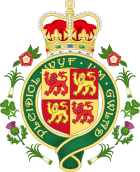Local Government Byelaws (Wales) Act 2012
| Act of the National Assembly for Wales | |
 | |
| Long title | An Act of the National Assembly for Wales to make provision for the powers of county councils, county borough councils, community councils and other public bodies to make byelaws; the procedure for making byelaws; the enforcement of byelaws; and for connected purposes. |
|---|---|
| Citation | 2012 anaw 2 |
| Introduced by | Carl Sargeant AM, Minister for Local Government and Communities |
| Territorial extent | Wales |
| Dates | |
| Royal assent | 29 November 2012 |
Status: Current legislation | |
| History of passage through Parliament | |
The Local Government Byelaws (Wales) Act 2012 (anaw 2) is an act of the National Assembly for Wales for giving local authorities in Wales the ability to make byelaws.
History
[edit]The bill was referred to the supreme court which upheld it.[1] Lady Hale noted "Constitutional adjudication is a new animal for us... [This case] comes before the [supreme] court, not in a concrete case, but as pure constitutional review along continental lines. This is, as far as I know, the first case in which this has happened. We are not used to deciding cases in the abstract, without reference to a particular set of facts."[1]
It was the first devolved bill to be referred to the Supreme Court before Royal assent.[2][3]
Provisions
[edit]The Act replaces the process for Welsh ministers and the UK ministers to approve byelaws made by local authorities in Wales.[4] The Supreme Court ruled that the provisions removing powers of UK ministers were "incidental to" and "consequential on" the main purpose of the law, which was to remove powers of the Welsh ministers.[5]
Reception
[edit]The process of approval of Welsh laws by UK ministers has been described as anachronistic.[6]
Comparison to other UK jurisdictions
[edit]The UK Parliament, Scottish Parliament and Northern Ireland Assembly retain control for approving bye-laws.[7]
Examples of bye-laws
[edit]Under the Act, Conwy County Borough Council introduced a byelaw "to prohibit the feeding of seagulls on North Shore, Llandudno, this should be finalised later this year."[8]
Byelaws can be used to enabling the clamping of cars.[9]
References
[edit]- ^ a b Bowcott, Owen (2012-11-28). "Supreme court becomes a constitutional animal". The Guardian. Guardian News & Media Limited. Archived from the original on 2014-10-11. Retrieved 2024-10-03.
- ^ Trench, Alan (2012-09-17). "Welsh byelaws and the UK Supreme Court". UK Constitutional Law Association. Archived from the original on 2020-09-22. Retrieved 2024-10-03.
- ^ Williams, John (2014-12-10). "Law Making in a Devolved Wales: Work in Progress". Legal Information Management. 14 (4): 266–276. doi:10.1017/S1472669614000577. ISSN 1472-6696.
- ^ Sherlock, Ann (2014-07-30). "Supreme Court ruling on Welsh legislation". UK Constitutional Law Association. Archived from the original on 2020-09-22. Retrieved 2024-10-03.
- ^ "New Judgment: Local Government Byelaws (Wales) Bill 2012 [2012] UKSC 53". UKSCblog. 2012-11-21. Archived from the original on 2017-06-27. Retrieved 2024-10-03.
- ^ Moon, David S.; Evans, Tomos (2017-08-01). "Welsh devolution and the problem of legislative competence". British Politics. 12 (3): 335–360. doi:10.1057/s41293-016-0043-3. ISSN 1746-9198.
- ^ Sandford, Mark (2015-12-22). "Local Authority Byelaws" (PDF). House of Commons Library.
- ^ Hemming, Jez (2015-07-22). "Seagull fightback begins as Conwy council introduces bye-law to crack down on feeders". NorthWalesLive. Reach Plc. Archived from the original on 2015-10-10. Retrieved 2024-10-03.
- ^ Shaw, Neil (2022-04-14). "Rules on car clamping and who is allowed to immobilise your car". WalesOnline. Reach Plc. Archived from the original on 2022-04-12. Retrieved 2024-10-03.
